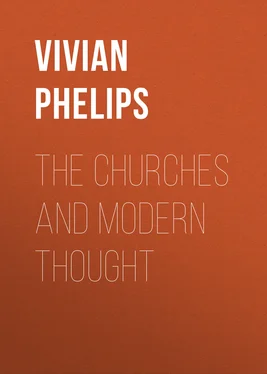Vivian Phelips - The Churches and Modern Thought
Здесь есть возможность читать онлайн «Vivian Phelips - The Churches and Modern Thought» — ознакомительный отрывок электронной книги совершенно бесплатно, а после прочтения отрывка купить полную версию. В некоторых случаях можно слушать аудио, скачать через торрент в формате fb2 и присутствует краткое содержание. Жанр: foreign_prose, foreign_religion, Философия, foreign_antique, на английском языке. Описание произведения, (предисловие) а так же отзывы посетителей доступны на портале библиотеки ЛибКат.
- Название:The Churches and Modern Thought
- Автор:
- Жанр:
- Год:неизвестен
- ISBN:нет данных
- Рейтинг книги:4 / 5. Голосов: 1
-
Избранное:Добавить в избранное
- Отзывы:
-
Ваша оценка:
- 80
- 1
- 2
- 3
- 4
- 5
The Churches and Modern Thought: краткое содержание, описание и аннотация
Предлагаем к чтению аннотацию, описание, краткое содержание или предисловие (зависит от того, что написал сам автор книги «The Churches and Modern Thought»). Если вы не нашли необходимую информацию о книге — напишите в комментариях, мы постараемся отыскать её.
The Churches and Modern Thought — читать онлайн ознакомительный отрывок
Ниже представлен текст книги, разбитый по страницам. Система сохранения места последней прочитанной страницы, позволяет с удобством читать онлайн бесплатно книгу «The Churches and Modern Thought», без необходимости каждый раз заново искать на чём Вы остановились. Поставьте закладку, и сможете в любой момент перейти на страницу, на которой закончили чтение.
Интервал:
Закладка:
In His incidental references to Moses, He adopts the language of the Scribes.... He never displayed knowledge of facts which could not be possessed by those of his own time.... To His intellectual powers in His humanity there seem to have been assigned the natural barriers of the time in which he lived.
“The Bishop does not perceive apparently that these arguments cut both ways, so that they tell against our Lord’s claim to foreknow the future quite as much as against His knowledge of the past. And we are entitled to ask how they can possibly be made to agree with the express testimony of the Evangelists that Moses and Elijah were seen in Christ’s company, and ‘spake of the decease which He should accomplish at Jerusalem.’”
I have quoted these apposite remarks at length because they will come with more force from the mouth of an orthodox believer than from anyone in doubt like myself. One cannot help wondering what the Bishop could have to urge in reply; for the ground is cut from under him by his own acceptance of so much of modern criticism. As he is a high dignitary of the Church, it is all the more puzzling. Referring to the remarks concerning Moses, it may be mentioned that, according to the critics, Moses is not a historical personage. 50 50 See, for instance, art. “Moses,” Encyclopædia Biblica .
Whether the Bishop accepts this or not it is difficult to say; but apparently he does, from his desire to explain that, “in His references to Moses,” Christ “adopts the language of the Scribes.”
Dr. Driver’s new book on Genesis has also called forth some adverse criticisms from the less advanced. For example, Dr. Lock, the Warden of Keble, enumerates several considerations in support of the general trustworthiness of the patriarchal narratives, and observes that the fact of inspiration, once admitted on the higher level of a moral and spiritual tone, may “well carry its influence over into details of fact, and turn the balance when otherwise uncertain.” Personally, I very much doubt whether the general public, once informed of the truth, will ever be induced to look at facts through Dr. Lock’s spiritual spectacles. Dr. Driver, it should be added, informs us that Abraham, Isaac, Jacob, and Joseph were presumably monotheists, though their monotheism is rudimentary, and the terms in which they express themselves “suggest much riper spiritual capacities and experiences,” being, “in some cases, borrowed evidently from the phraseology of a much later age .” Can we depend upon such narrators to furnish us with true history? Commenting on Dr. Driver’s “impossible interpretations” of the words, “it shall bruise thy head,” and of “the story of the Fall,” his reviewer in the Church Times asks: “Was it, or was it not, a promise made by God? This is the plain question which Dr. Driver’s readers are forced to ask.” Sceptical truthseekers, also, are asking the same question. When will they receive a “straight” answer?
§ 2. A Summary of the Results of Bible Criticism
The general public know little or nothing of the results of Bible criticism. Why should they? Not only do they deem it a dull subject, but those who attend church are being informed from the pulpit that “the Gospels have been battered by years of criticism, but have come out of it stronger than ever.” 51 51 Quoted from a sermon by the Bishop of London in Fulham parish, Christmas Day, 1904. Compare this with Dr. Kirkpatrick’s remark, p. 2 of his book, The Divine Library of the Old Testament : “It is true that the critical investigation of the Bible raises not a few questions of grave difficulty.”
It is easy enough to make statements of this kind, and, doubtless, they serve temporarily to quiet the fears of a congregation who know very little of the subject, and are only too glad to believe what they are told so authoritatively; but, unfortunately, such statements are, to put it mildly, misleading. The ordinary man is wofully ignorant of the “Higher Criticism.” His ideas of Bible difficulties are mostly confined to common sense. He knows, perhaps, that scoffers of the London parks freethinking type gibe at Holy Writ, and he may himself have made fun of some passages that appear absurd; but here his knowledge of Bible criticism ceases. He is not aware that the critics are a body of the most erudite experts in theology, whose only motive for offering their opinion is to give to the world the result of their arduous research—the motives, in fact, of a Bruno, a Darwin, or a Pasteur.
In view of this widespread ignorance, I propose to enumerate briefly a few of the results of modern criticism, and, in giving these results, I shall omit those arising from a study of comparative mythology and of evolution, as I have devoted separate chapters to that purpose.
A work has been issued lately which sums up the conclusions of Bible criticism—higher, 52 52 “The adjective ‘higher’ (the sense of which is often misunderstood) has reference simply to the higher and more difficult class of problems, with which, as opposed to textual criticism, the ‘higher’ criticism has to deal” (see Preface to The Higher Criticism , being three papers by S. R. Driver, D.D., and A. F. Kirkpatrick, D.D.).
lower or textual, and historical. It is called the Encyclopædia Biblica . Its four massive volumes set forth the new views, and support them by a mass of learning which deserves our serious consideration. 53 53 See Appendix.
Space permits of my giving only a few notes of its conclusions, and but meagre details of the wealth of evidence in support of them.
The Creation Story a Myth. —The story of the Creation as given in Genesis originated in a stock of primitive myths common to the Semitic races. Its coincidences with the Babylonian myth are so numerous that it is impossible to doubt the existence of a real historical connection between them. Many indications show that not till after the Exile in the sixth century B.C. did the story take its present shape.
The Patriarchs Unhistorical Figures. —Then, again, all the stories of the Patriarchs are legendary; they may contain some truth, though how much will probably never be known; to suppose them entirely true is to throw historical criticism altogether overboard. Dr. Peters is the Episcopal rector of a large parish in New York, who has done good service in the past, both as Professor of Biblical Literature in the Episcopal Seminary at Philadelphia and as the first leader of the expedition to Babylonia sent out in 1888 by the University of Pennsylvania. He has lately written a book called The Early Hebrew Story: Its Historical Background . Canon Cheyne, reviewing this book in the Hibbert Journal for January, 1905, remarks: “It will be granted that Dr. Peters’s view of the origination of the stories of Abraham, Isaac, and Jacob, and, to some extent, of Joseph, in myths, legends, and traditions of sanctuaries, is a sound one.”
Book of Genesis Legendary. —The book of Genesis is a composite narrative based on older records long since lost. It appears to have been compiled in the seventh century b.c., and to have been added to again later. The story of the Deluge is a Hebrew version of the Babylonian epic.
Book of Exodus Legendary. —The book of Exodus, too, is another composite legend which has long been mistaken for history. Sober history gives no warrant for supposing that the signs and wonders wrought by Moses ever occurred, that the first-born of Egypt were ever slain, or that Pharaoh was ever drowned in the Red Sea.
Moses a Legendary Character. —The historical character of Moses has not been established, and it is doubtful whether the name is that of an individual or that of a clan. The alleged origin of the Ten Commandments is purely legendary; it is probable that they were framed not earlier than the time of Amos. It is admitted even by conservative critics that the original worship of the Israelites was not of an ethical character.
Читать дальшеИнтервал:
Закладка:
Похожие книги на «The Churches and Modern Thought»
Представляем Вашему вниманию похожие книги на «The Churches and Modern Thought» списком для выбора. Мы отобрали схожую по названию и смыслу литературу в надежде предоставить читателям больше вариантов отыскать новые, интересные, ещё непрочитанные произведения.
Обсуждение, отзывы о книге «The Churches and Modern Thought» и просто собственные мнения читателей. Оставьте ваши комментарии, напишите, что Вы думаете о произведении, его смысле или главных героях. Укажите что конкретно понравилось, а что нет, и почему Вы так считаете.












